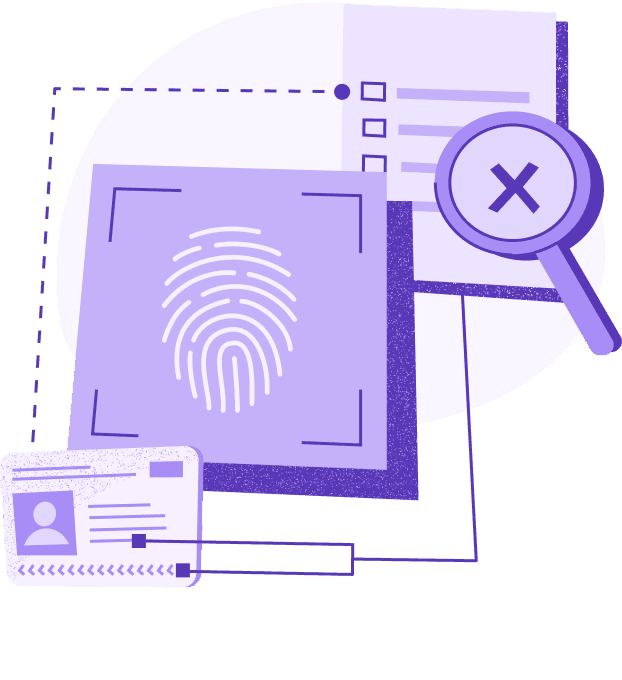Article
4 min read
A Guide to Employee Background Checks in India
Employee background checks
Legal & compliance

Author
Michał Kowalewski
Last Update
September 05, 2025

Table of Contents
Essential information for a background check in India
Are background checks legal in India?
Types of background checks that are illegal in India
Common background check industries in India
Background check mistakes to avoid in India
Step-by-step guide to employee background checks in India
Key takeaways
- Background checks are common in India, especially for sensitive industries like IT and education. They are legal, however, adhering to data privacy regulations like the Personal Data Protection Bill is crucial.
- Specific checks vary based on the position. Verifying education and employment history is common, while credit checks are less frequent. Social media screening is gaining traction, but legality varies.
- Obtain written consent, avoid discrimination, and document the process. Communicate findings to the candidate and allow for explanations.
Employee background checks should be an integral part of your hiring process in India. Although not mandatory, they are a common practice, especially in IT, banking, finance, healthcare, education, and government organizations.
India’s IT industry is a cornerstone of its economy, employs over 5.4 million people and contributes to 9.3% of the GDP. This sector, characterized by a mix of global corporates and a rapidly growing digital and tech start-up ecosystem, is a testament to the high caliber of talent available in India.
However, employees looking to take advantage of India’s great talent pool, should be careful and implement thorough background checks to prevent scenarios like those faced by Accenture and Cognizant, where the absence of proper employee screening led to the dismissal of employees with fake credentials.
In this article you’ll learn:
- How to run an effective and legal employment screening in India
- What are the common types of employee checks in India
- Step-by-step process of a thorough employee screening
- What mistakes to avoid when performing a background check in India
Essential information for a background check in India
An employee background check is the process of verifying a potential hire’s work history, education, professional qualifications, and any criminal records they might have. It’s particularly beneficial to run before finalizing an employment offer or signing a contract, ensuring the candidate meets the company's standards and requirements.
In India, employee background checks are governed by the Information Technology Act, 2000, and the Personal Data Protection Bill, 2019.
- Information Technology Act, 2000: This Act is India's primary law on cybercrime and electronic commerce, laying down the legal framework for electronic governance by giving recognition to electronic records and digital signatures. It also defines cybercrimes and prescribes penalties for them.
- Personal Data Protection Bill, 2019: Introduced to establish a framework for data protection in India, it aims to protect individuals' personal data, establish a Data Protection Authority, and set up processes for safe data handling
These regulations emphasize the protection of personal data and ensure that background checks are conducted responsibly and ethically. The key organization overseeing data protection and privacy in India is the Data Protection Authority of India (DPAI), which is responsible for enforcing data protection laws and regulations.
Are background checks legal in India?
Background checks are legal in India, and they are widely conducted by employers as a standard part of the hiring process.
However, it's important for employers to adhere to the regulations outlined in the Information Technology Act and the Personal Data Protection Bill to ensure compliance with the law.
Employers must obtain consent from the individual before conducting background checks and must handle personal data with care and confidentiality. Although it’s not specified in the law, written consent is recommended for documentation and compliance purposes.
Compliance
Types of background checks that are illegal in India
India's job market offers exciting opportunities for global tech companies, but running legal background checks requires caution. While verifying qualifications and experience is encouraged, certain practices cross legal and ethical boundaries.
Stay clear of:
- Biometric data without consent: Fingerprints, iris scans, and similar require explicit written permission from the candidate
- Unauthorized information access: Hacking, buying data from third parties, or exceeding authorized checks are strictly prohibited
- Ignoring data privacy laws: India's Personal Data Protection Bill 2022 sets clear limitations on data collection and processing during background checks
Violating data protection laws in India can lead to legal repercussions, including fines and damage to the employer's reputation. Remember that permissible checks exist. Verifying education, employment history, and criminal records through authorized channels remains generally acceptable.
Common background check industries in India
In India, various industries rely on employee background checks to ensure the integrity and reliability of their workforce. Some of the common industries where background checks are prevalent include:
- Information technology: The IT sector in India background checks are common because of its handling of sensitive data and intellectual property, along with the persistent threat of scammers who may misrepresent qualifications or engage in fraudulent activities.
- Banking and financial services: The emphasis in this sector is on financial integrity and adherence to India's financial regulations. Background checks help in identifying individuals with a history of ethical conduct, crucial for handling personal financial information and assets, thus ensuring customer trust and sectorial compliance
- Healthcare: Background checks in healthcare are indispensable for verifying professional credentials and ensuring compliance with India's healthcare standards. This is crucial for providing safe and effective patient care, maintaining patient confidentiality, and upholding the professional integrity of healthcare services
- Education: Background checks help screen potential teachers and staff for any history of child abuse or violence, creating a safer learning environment and building trust with parents by demonstrating a commitment to student safety.
- Government positions: Background checks aren't just a formality; they're a line of defense for national security. From vetting access to classified information to preventing corruption, thorough checks ensure individuals entrusted with public power and sensitive matters possess the integrity and trustworthiness the nation deserves.
| Type of Check | Common in India? | Reason |
|---|---|---|
| Criminal Record Check | Common | This check is crucial for roles involving security clearances, handling sensitive information, or working with vulnerable populations such as children and the elderly |
| Employment History Verification | Common | Important for assessing the candidate's work experience, performance, and integrity |
| Educational Qualifications Verification | Common | Ensures the candidate possesses the required education and skills for the role |
| Credit History Check | Less Common | Less common than the others and typically conducted for positions that involve financial responsibilities, access to sensitive financial information, or handling of company funds |
| Reference Check | Common | Provides insights into the candidate's character and work ethic through past colleagues or supervisors |
| Social Media Screening | Common | Increasingly common, this involves reviewing a candidate's public online presence to gather insights into their behavior, character, and professionalism |
| Drug and Alcohol Testing | Less Common | Not as common in India as in some other countries, and its legality and practice can vary depending on the industry and the nature of the job |
Background check mistakes to avoid in India
Whether you’re hiring employees or contractors in India, there are a few things you shouldn’t do as an employer when it comes to background checks:
- Violating data protection laws: Failing to obtain consent or mishandling personal data can lead to legal consequences and damage the employer's reputation
- Discriminatory practices: Avoid using background checks to discriminate against candidates based on their caste, religion, or gender, as it's prohibited by law
- Incomplete verification: Skipping crucial verification steps, such as educational qualifications or employment history, can result in hiring unqualified or dishonest candidates
- Lack of transparency: Failing to communicate the purpose and scope of the background check to the candidate can lead to mistrust and potential legal issues
- Relying solely on online information: Depending solely on online information without cross-verification can lead to inaccurate assessments of the candidate
Step-by-step guide to employee background checks in India
Employers looking to hire in India should follow the list of steps below to ensure legal and effective and thorough employee background checks.
- Obtain consent: Before conducting a background check, employers must obtain written consent from the individual, clearly outlining the purpose and scope of the background check
- Verify identity: Verify the candidate's identity using government-issued identification documents such as Aadhaar card, passport, or driver's license
- Check employment history: Verify the candidate's employment history, including previous positions held, duration of employment, and reasons for leaving
- Check educational qualifications: Verify the candidate's educational qualifications from recognized institutions or universities
- Check criminal record: Conduct a criminal record check through the local police station or online portals to ensure the candidate has no criminal history
- Verify address: Verify the candidate's current and previous residential addresses to establish their residency history
- Check references: Contact the candidate's provided references to gain insights into their work ethic, skills, and professional conduct
- Check social media: If relevant to the job, consider reviewing the candidate's social media profiles to assess their online presence and ensure alignment with the company's values
- Document the process: Maintain detailed records of the background check process, including consent forms, communication with third parties, and the information gathered
- Inform the candidate: Once the background check is complete, communicate the findings to the candidate and allow them to address any discrepancies or provide context for the information obtained
You can also automate this process using Deel, and get a fast employee background check, with results coming in a matter of minutes.
After exploring various providers, it's clear that Deel is the best on the market. We were able to hire approximately 40 employees in the Philippines within a matter of months. Their background check process was easy and effective and made us feel safe about hiring in new markets. We're truly grateful for the opportunity to work with this team!
—Bree Cohen,
VP of talent
Background checks

Michał Kowalewski a writer and content manager with 7+ years of experience in digital marketing. He spent most of his professional career working in startups and tech industry. He's a big proponent of remote work considering it not just a professional preference but a lifestyle that enhances productivity and fosters a flexible work environment. He enjoys tackling topics of venture capital, equity, and startup finance.
















